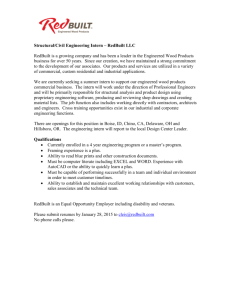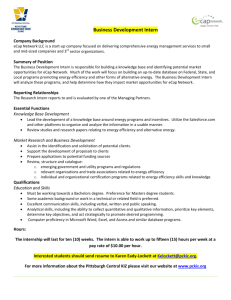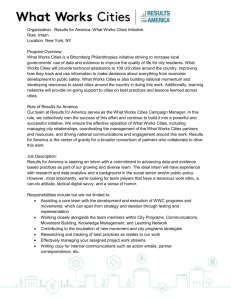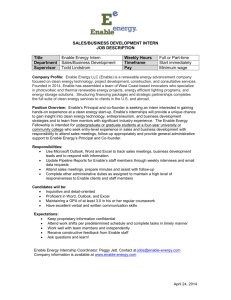PROCESS RECORDING (Sample) - Bridgewater State University
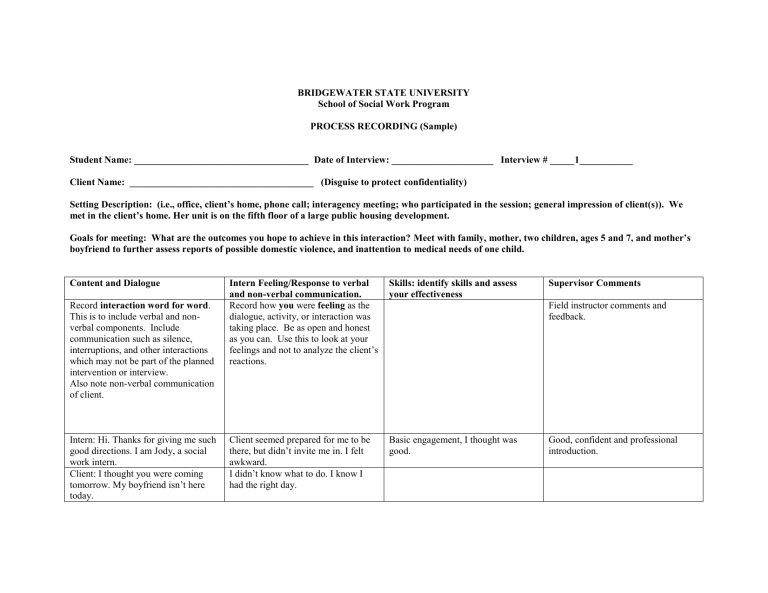
BRIDGEWATER STATE UNIVERSITY
School of Social Work Program
PROCESS RECORDING (Sample)
Student Name: ____________________________________ Date of Interview: _____________________ Interview # _____1___________
Client Name: ______________________________________ (Disguise to protect confidentiality)
Setting Description: (i.e., office, client’s home, phone call; interagency meeting; who participated in the session; general impression of client(s)). We met in the client’s home. Her unit is on the fifth floor of a large public housing development.
Goals for meeting: What are the outcomes you hope to achieve in this interaction? Meet with family, mother, two children, ages 5 and 7, and mother’s boyfriend to further assess reports of possible domestic violence, and inattention to medical needs of one child.
Content and Dialogue
Record interaction word for word
This is to include verbal and nonverbal components. Include communication such as silence, interruptions, and other interactions
. which may not be part of the planned intervention or interview.
Also note non-verbal communication
Intern Feeling/Response to verbal and non-verbal communication.
Record how reactions. you were feeling as the dialogue, activity, or interaction was taking place. Be as open and honest as you can. Use this to look at your feelings and not to analyze the client’s
Skills: identify skills and assess your effectiveness
Supervisor Comments
Field instructor comments and feedback. of client.
Intern: Hi. Thanks for giving me such good directions. I am Jody, a social work intern.
Client: I thought you were coming tomorrow. My boyfriend isn’t here today.
Client seemed prepared for me to be there, but didn’t invite me in. I felt awkward.
I didn’t know what to do. I know I had the right day.
Basic engagement, I thought was good.
Good, confident and professional introduction.
Intern: I confirmed it for today, but can come back tomorrow to meet him. Why don’t we use this time to talk? Can I come in?
Client: OK
She looked nervous. I didn’t want to leave but also felt pushy.
Intern: I am here because the person that did the investigation said you needed support.
Client: I don’t. My boyfriend has a car and helps with everything. I want to be left alone. My kids have everything they need. Even Ipads.
She crossed her arms in front of her chest, and looked closed down.
I thought offering support was a good thing!
I tried to clarify purpose but I think it made her defensive.
She is mandated to work with us, so I think you handled it well. You tried not to be put off, and succeeded. You are respectful and that matters.
Your approach of persistence and establishing a respectful tone seemed to work.
Intern: They must be happy with those!
Maybe I can help with camp?
I felt that Ipads are not needed, but didn’t want to be critical.
Engagement and ethics that require non-judgmental attitude.
Support is a good think, but only feels that way when you want it, and you feel you are asking for it. Try different ways. For example “It is good to hear that you have support.
Can I let you know what DCF can sometimes offer?”
Be careful not to be overly confident about resources such as camp. It makes you feel better, but there is criteria, etc. Yes, good to be aware of your own values with material things, as different than her pride in being able to see that she can provide what she perceives other children as having.
Client: That would be good. They don’t have to leave the city though do they, and go to the woods?”
No, there are camps in the city. Don’t you like the woods?
This felt better to me and more like a conversation. I felt less nervous.
No, I hate mosquitos. (she laughed). I felt sad that she is afraid of the country and stuck in her housing project. I love the woods and find it relaxing.
Intern: Have you always lived in
Tried to be open, and use listening and humor.
Be careful of your values and her experience. What does she see as relaxing? Her housing may offer a sense of comfort and familiarity.
Explore and learn as you go.
Good. It opens the door to her
Brockton?
Client: Yes. My boyfriend wants to move back to New Jersey because of all the trouble here, but I don’t want to leave my Mom. (she spoke almost in a whisper)
Intern: That sounds like a hard thing to even think about.
I wanted to say, “don’t go,” but I know this wasn’t right.
Intern: It is important because of the
51A. Could you let him know I need to talk with him? This may put pressure on you, but it sounds as if he is important and the report concerned his relationship with you and your children.
I will try, and find out about the camp, ok?
I will be back tomorrow at ten to meet with you, the children and talk with
Joe. Please let me know if you need anything before. Here is my number.You can also call another
I just felt worried about her. experience.
Client: It is. I have to go pick up the kids now.
Intern: What time works for tomorrow to meet Joe and the kids?
Client: I think he will be at his cousins tomorrow.
I felt annoyed and like I was getting the run around. Doesn’t she know I have other things to do, too?
I think this was using empathy and engagement, and a clinical skill of reflecting back what I thought she was getting at. I don’t know if it was effective.
This is important to the assessment.
She shared an important piece of information, and you stayed with the feeling instead of overwhelming her with questions.
She may have a different agenda.
Think about what she could be feeling. This is different than avoidance form a friend. Apply your thinking and sensitivity. That said, no one likes being avoided, but this is more.
This is clear and I think useful, but did you show anger or frustration?
Excellent ending. You let her know what you would do, and also communicated to her that she may have issues that would require additional assistance.
number if you had an emergency and felt you or the kids were in danger.
Thanks for taking the time to talk with me today.
Client: Ok
Assessment of client and of your work: How do you think this sessions went, what were your impressions of the client(s), what strengths did you identify, what is your plan for your next interaction with this client? I thought it went OK, but was harder than I thought. I have the feeling she cares about her kids, but also focuses on her boyfriend, and what he wants. She seems to have self-esteem issues. I did have a sense that the relationship would take some time to build.
Questions for supervision: What would you like your supervisor to pay special attention to in reviewing your process recording?
What did I do that was helpful? Should I have been more forceful in stating concerns? Are there ways of approaching this conversation that would have allowed her to share more? When I feel like I am getting the “run around,” how can I handle it?
Adapted from 2006 Virginia Commonwealth University School of Social Work Field Instruction Manual
Jody, I think you made a good effort and thought on your feet. Looking forward to discussing your questions, and how you can further develop your interviewing and engagement skills.

